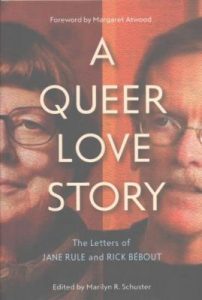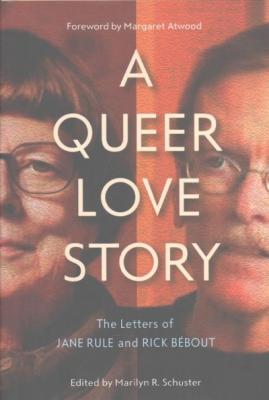 A Queer Love Story: The Letters of Jane Rule and Rick Bébout
A Queer Love Story: The Letters of Jane Rule and Rick Bébout
Edited by Marilyn R. Schuster
Univ. of British Columbia Press. 619 pages, $49.95
FANS of lesbian icon Jane Rule will celebrate the publication of her letters to a man whom she came to love. Less familiar to U.S. readers, Rick Bébout—editor of the Toronto gay paper The Body Politic and the book Flaunting It: A Decade of Gay Journalism from The Body Politic—is equally engaging in these letters. At first the two were professionally related as editor and columnist: Rule (1931–2007) wrote a column for TBP for ten years and gradually became close to Bébout. Intimacy could hardly have been predicted between writers whose lives were so different: Bébout (1950–2009) lived in the heart of Toronto’s gay community, loved the bars, and had many short-term affairs, while Rule, nineteen years older, lived quietly on Galiano, an island off Vancouver, with her longtime partner Helen Sonthoff. Rule and Bébout met several times in Toronto, and also in Galiano, relishing their time together.
Having in common a deep and powerful bond with their community, Rule and Bébout became public figures in the fight for LGBT equality. Rule was the only well-known, openly lesbian Canadian, and Bébout guided TBP through obscenity trials after Canada Customs seized his paper and one of her novels at the border. TBP was dragged into court several times, as were Little Sisters and Glad Day, Canadian bookstores, an ultimately futile move by the government but a costly one for the defendants. Canada may currently enjoy a very positive image in the U.S., but we should not forget the state-sponsored discrimination of past decades when gay literature was conflated with pornography.
A Queer Love Story is a wonderful book full of daily life details, notes on the writing process, and commentary on gay and lesbian issues. It will introduce younger readers to two exemplary members of the gay community. Rule and Bébout typed long letters before and after e-mail existed. Bébout tells Rule that one day their letters will reveal the “concerns of our time and tribe.” They also reveal two very serious people who don’t take themselves altogether seriously. A strong moral compass guides their discussions, but both writers have a fine sense of irony.
 Although Rule’s last book, Loving the Difficult, offers many personal details about the author, A Queer Love Story, partly because of its length, gives a fuller picture. Diagnosed in her forties with rheumatoid arthritis, she delays its development by swimming in her own pool, and she seems to have had a full and stimulating social life as well as a close connection with her parents. At times her pithy comments are delightful, as when, for example, she writes: “the channel of my imagination shows nothing but snow.” At her pool she appreciates “all those marvelous women, gorgeously, gorgeously old … sunning, swimming, floating about in teasing or earnest conversation.”
Although Rule’s last book, Loving the Difficult, offers many personal details about the author, A Queer Love Story, partly because of its length, gives a fuller picture. Diagnosed in her forties with rheumatoid arthritis, she delays its development by swimming in her own pool, and she seems to have had a full and stimulating social life as well as a close connection with her parents. At times her pithy comments are delightful, as when, for example, she writes: “the channel of my imagination shows nothing but snow.” At her pool she appreciates “all those marvelous women, gorgeously, gorgeously old … sunning, swimming, floating about in teasing or earnest conversation.”
Although Rule and Sonthoff lived together for more than forty years, Rule believes that short-term lesbian relationships should be highly valued as well. Both she and Bébout express skepticism about same-sex marriage. Rule wears her fame lightly, recalling droll events connected with the various honors she received. Documentaries were made about her, and the film version of her first novel, Desert of the Heart, enjoyed great success.
Rick Bébout’s side of this correspondence eloquently documents AIDS in Toronto in the 1980s and early ’90s. I cannot praise highly enough the depth of feeling and analysis of the epidemic in these letters. Bébout describes taking care of friends, dealing with his own HIV status, working for an AIDS agency, mourning the “massive loss” to his community. His reports on funerals are heartbreaking. One way he copes is by reading the letters of Virginia Woolf.
I felt privileged to be in the presence of these two gifted, courageous writers, both of whom left the U.S. for Canada when they were young. Imagine a book of 600 pages that seems to end too soon. Will we ever again, in this age of texting, have such a lively, spirited, and revealing correspondence?
Margaret Cruikshank’s latest book is titled The Gay and Lesbian Liberation Movement (Routledge).






